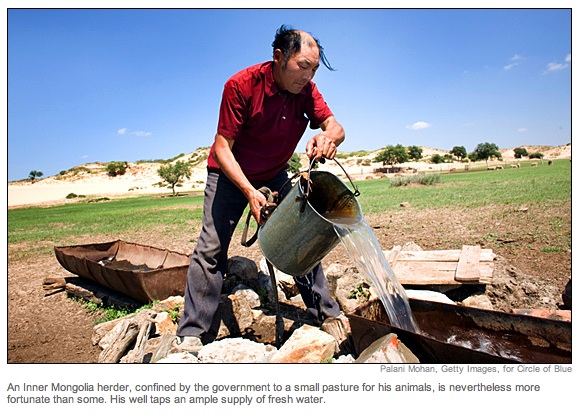| Circle of Blue |
| Jan 21, 2008 |
| By W. Chad Futrell |
 Between
the congested and heavily polluted neighborhoods and industrial
zones around Beijing, and the trackless and drying grasslands of
Inner Mongolia lies the rocky "sandy lands," where the Circle of
Blue team made what would be the first of many stops to talk to
Mongol herders, a minority in their own land. Less than one in
five Inner Mongolians is a native Mongol, according to Chinese
census figures. Between
the congested and heavily polluted neighborhoods and industrial
zones around Beijing, and the trackless and drying grasslands of
Inner Mongolia lies the rocky "sandy lands," where the Circle of
Blue team made what would be the first of many stops to talk to
Mongol herders, a minority in their own land. Less than one in
five Inner Mongolians is a native Mongol, according to Chinese
census figures.
We had
just passed a lake when our leader, Chen Jiqun, an
environmentalist and prominent Chinese artist, spotted a Mongol
herder house along the road. We pulled onto the dirt and mud
drive leading to a small patch of fenced-in green grass. A
Mongol woman and her 20-year old son looked at our minivan
suspiciously. They did not receive many unannounced visitors,
especially a Han Chinese and three foreigners.
"Sain
Baina Uu!" yelled Chen, showing a smile we would see often over
the next five days. He talked with the woman, Qiqige, for a
couple of minutes in fluent Mongolian before she turned and
walked back into her house. The rest of us followed. It was time
to drink milk tea and eat homemade cheese.
Her shy
son disappeared to find his father, who joined us. Qiqige and
her family live in one of the areas subject to Inner Mongolia's
policy of enclosing herds and herders, which has forced them to
rely upon a small pasture. The grass gets shorter every year.
Indeed, sand dunes surround their pasture, and Qiqige fears the
dunes may take over even more of their allotted land. The
enclosure policy not only has created a disastrous environmental
effect, it has also cut divisions into Mongol herder
communities.
Previously
they had grazed their sheep and cows along with 70 other
families. In winter, they would stay in their house and use
pastures close by. In summer, they would migrate with the other
families, to a different place every year so the grasslands
recovered.
"Before,
we would move with many families," she said. "But now it is just
our family and we don't see the other families very much." The
change in herding practices means that women are much more
isolated than men. While men can still ride their horses or
motorcycles to see friends, the work of women preparing and
cooking food and daily chores, effectively confines them to the
house. From churning the milk into butter for cheese and yogurt
to making beef jerky, women are busy all day.
"In the
summertime, when we moved together, we would prepare and cook
food together, looking after each other's children," said Qiqige.
"We worked and told stories. There were always interesting
stories." She smiles at the memories. Instead of a summer full
of friends and stories, she heads back to her house to prepare
dinner, alone. Qiqige and her husband were not optimistic about
the future of herders and hoped that their son could do well
enough in school to go to college.
When we
asked about the water supply, Qiqige said, "We don't have a
problem with water because we have a well, and it is not even
that deep yet." Some of her friends, though, are not as
fortunate, she said. They must now travel long distances to
either a friend's well or a water source that is not fenced off.
Before leaving, Chen
handed them a slip of paper with his contact information, along
with translated copies of several Chinese laws pertaining to the
grasslands, property rights, and desertification. This meeting,
like others, was a time to recruit support and provide guidance.
W.
Chad Futrell is a Ph.D. candidate in development sociology at
Cornell University. He recently completed two years of fieldwork
on transnational environmental cooperation to prevent
desertification and protect wetlands in Northeast Asia, funded
by Fulbright-Hays and Korea Foundation fieldwork fellowships.
Reach him at
wchadfutrell@gmail.com.
Research and editing assistance for this article was provided by
Jennifer L. Turner, the director of the China Environment Forum
at the Woodrow Wilson Center in Washington, DC. She can be
reached at
cef@wilsoncenter.org. |





